|
George Tenet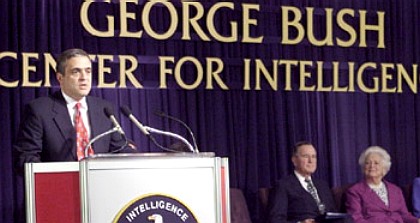
George Tenet is the type of guy that real hardcore CIA officers typically love to hate: a lifelong politico with no experience doing intelligence work who waltzes in at the behest of a president and takes over the show. But whatever points he may have lost for being a bureaucratic schmuck, the real test of loyalty lies ahead. If Tenet decides to take the hit for those pesky missing Weapons of Mass Destruction, he'll go down in Company history as a hero. If he pawns it off on his case officers and analysts, he'll be remembered not only as a villain but also probably as the guy who destroyed the remnants of what the CIA was originally intended to be. Tenet's resume lends itself to government work. He went to Georgetown and Columbia, majoring in "It's A Big World Out There, And We're Not The Only Country In It."
Tenet performed such important duties as coordinating directives on priorities and directing the oversight of negotiations, not to mention preparing reports on such oversight and indeed coordinating oversight activities, not to mention coordinating the oversight of legislative statutory reporting requirements. You can clearly see how all this experience would prepare a man for intelligence work. The only active verb to be found anywhere on Tenet's resume was "kiss" and the only subject for that verb was "ass." This particular specialty would, in the final analysis, vault him to the top. By 1994, Tenet had latched onto a hated CIA director John Deutch, who ran amuck in the Agency by operating essentially on the theory that the CIA shouldn't do so much of that nasty spying stuff. Deutch left in 1996, and his designated replacement was Tony Lake, Bill Clinton's National Security director, a widely despised Washington insider with a reputation for making policy political. When Clinton tried to push Lake into the CIA director's job, muffled screams of anguish could be heard emanating from the Agency's headquarters in Langley, Va., and not-at-all-muffled screams of outrage were heard from the Republican senators who were in charge of confirming any CIA director nomination.
The CIA was about as worthless a pile of crap as could be imagined at this stage. The collapse of the Soviet Union had provoked an existential crisis about what the agency was supposed to do with itself, and much hand-wringing ensued at virtually every level of government, and within the agency itself. Tenet quickly won over both the CIA grunts and the White House suits mostly on the basis of his personal charm. He was a key player in the Clinton administration's ludicrously ineffective efforts to nab Osama bin Laden, and later in the Bush² administration's spectacularly ineffective efforts to do the same thing. Unlike most political appointees, Tenet stayed on after Clinton left office, mostly due to an aggressive effort to ingratiate himself with George W Bush, an extremely social animal who responded well to flattery and personal attention. Although the CIA's failure to anticipate or prevent the al Qaeda attacks of September 11 would seem to be gross derelictions of duty (especially since we knew about the strategy in advance), Tenet managed to dodge or deflect responsibility, part of a tightly coordinated decision at every level of the Bush administration to stonewall the public on the topic of advanced knowledge.
Fortunately for Tenet, most of the known warnings had come through the FBI and not the CIA. It wasn't hard to see how this would happen, since Tenet could bury any document under an "above top secret" clearance for eternity just by sneezing on it. While 9/11 precipitated a flurry of criticism of the Agency, very little of the shitstorm stuck to Tenet's slightly rumpled gray suits. The CIA director managed to keep coming up roses until January of 2003, when his buddy George W. spoke the fatal "16 words" that would bury the Agency and its director in controversy for the foreseeable future: "The British government has learned that Saddam Hussein recently sought significant quantities of uranium from Africa." Would that it had stopped there. This, along with numerous other claims about Iraqi WMDs would encompass not only Tenet but the entire CIA into a morass of investigations, informational hearings and independent panels that shows no sign of slowing as of this writing.
Clearly, the White House had some 'splaining to do. Tenet and the CIA were appointed to take the fall. The White House (and its Congressional surrogates) have repeatedly characterized the Iraqi WMD charges as an "intelligence failure," and Tenet has tentatively agreed to play along with this characterization -- despite the fact that to most casual observers, it seems fairly obvious that these claims originated at the express bidding of the White House in general (and Dick Cheney in particular). Tenet doesn't seem to be in any particular hurry to tender his resignation, however. In a recent speech, he defended his position and trumpeted his importance, saying "the President of the United States sees me six days a week, every day." The last thing any president wants is a disgruntled former CIA chief out on the streets, which no doubt accounts for the long, secure tenure of William Casey. But Tenet's current address is the corner of Rock St. and Hard Place Ave. Sneakier, meaner, tougher S.O.B.s than him have been sacrificed to the Gods of Public Deniability in the past, and it's an election year. It might just be time to start updating that resume. I hear there's an opening for a special executive assistant to a senior coordinator for something or other... Bonus color commentary from Slate Magazine: "As deputy director of the CIA, [Tenet] shaved his beard at his boss's request." Timeline
|
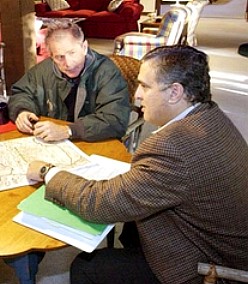 Tenet proceeded to completely fail to distinguish himself in any way in the conventional "real world" sense for about the next 20 years. Needless to say, this meant he was a roaring success in terms of the Washington, D.C., cultural black hole, filling a series of positions that began with "Assistant to" or "Director for" or "Special Assistant to," with a series of incrementally more important people and/or offices following the preposition. Only in Washington can you make "being an assistant" into a life's vocation.
Tenet proceeded to completely fail to distinguish himself in any way in the conventional "real world" sense for about the next 20 years. Needless to say, this meant he was a roaring success in terms of the Washington, D.C., cultural black hole, filling a series of positions that began with "Assistant to" or "Director for" or "Special Assistant to," with a series of incrementally more important people and/or offices following the preposition. Only in Washington can you make "being an assistant" into a life's vocation. 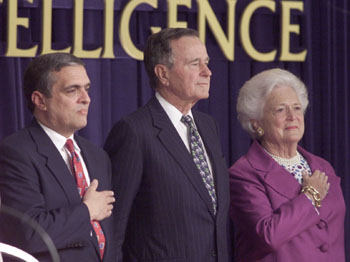 Lake's nomination sank like a rock, and with no backup plan in place, Clinton turned to the "special assistant for" and asked him to step up to the plate. By virtue of having been a nonentity for 20 years in the Beltway, Tenet hadn't pissed anyone off inordinately. He got the job.
Lake's nomination sank like a rock, and with no backup plan in place, Clinton turned to the "special assistant for" and asked him to step up to the plate. By virtue of having been a nonentity for 20 years in the Beltway, Tenet hadn't pissed anyone off inordinately. He got the job. 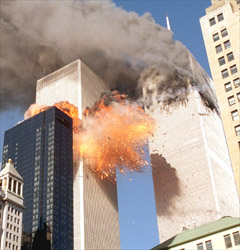
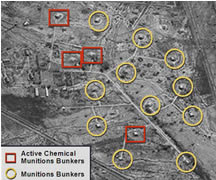 Tenet had to step forward and publicly abase himself for the "16 words." Unfortunately, there were about 900 other words in the same State of the Union address which turned out to be completely untrue as well. These included claims that Iraq had:
Tenet had to step forward and publicly abase himself for the "16 words." Unfortunately, there were about 900 other words in the same State of the Union address which turned out to be completely untrue as well. These included claims that Iraq had:
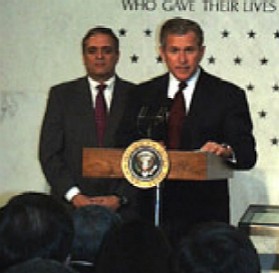 This was also flatly wrong. al Qaeda was in Iraq, in the same way that the organization is in the
This was also flatly wrong. al Qaeda was in Iraq, in the same way that the organization is in the